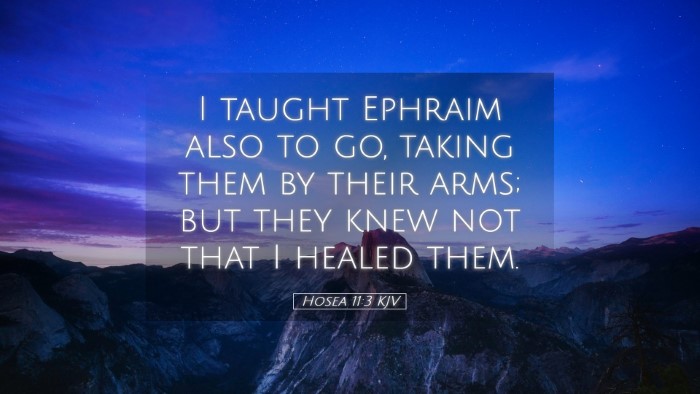Old Testament
Genesis Exodus Leviticus Numbers Deuteronomy Joshua Judges Ruth 1 Samuel 2 Samuel 1 Kings 2 Kings 1 Chronicles 2 Chronicles Ezra Nehemiah Esther Job Psalms Proverbs Ecclesiastes Song of Solomon Isaiah Jeremiah Lamentations Ezekiel Daniel Hosea Joel Amos Obadiah Jonah Micah Nahum Habakkuk Zephaniah Haggai Zechariah MalachiHosea 11:3
Hosea 11:3 KJV
I taught Ephraim also to go, taking them by their arms; but they knew not that I healed them.
Hosea 11:3 Bible Commentary
Commentary on Hosea 11:3
Verse Text: "I taught Ephraim also to go, taking them by their arms; but they knew not that I healed them." (Hosea 11:3, KJV)
Introduction
The book of Hosea is a profound reflection on God's enduring love for His people, set against the backdrop of Israel's unfaithfulness. In Hosea 11:3, the Lord expresses His deep love and parental care for Ephraim, symbolizing the Northern Kingdom of Israel. This verse reveals God's tender guidance as He leads His people and signifies their lack of recognition of His merciful intervention in their lives.
Exegesis of the Verse
1. The Image of Instruction:
- “I taught Ephraim also to go”: This phrase illustrates God as a loving parent teaching a child how to walk. Matthew Henry notes that God's teaching was both instructional and practical, representing divine guidance in the early stages of Israel’s national life.
- “Taking them by their arms”: The imagery here conveys a personal, hands-on approach. Albert Barnes emphasizes that God’s nurturing care involved close intimacy and support, enabling Israel to move forward spiritually and physically.
2. Lack of Recognition:
- “But they knew not…”: This segment highlights Israel’s spiritual blindness and ingratitude. Adam Clarke points out that despite experiencing God's love and mercy, the people failed to recognize His actions in their lives, illustrating a common human tendency to overlook divine intervention.
- “That I healed them”: The healing here refers not only to physical restoration but also to spiritual renewal. Matthew Henry connects this with God’s redemptive work, which is often unacknowledged by those who benefit from it.
Theological Implications
The theological implications of Hosea 11:3 are profound, particularly when considering the nature of God as a caregiver and the dynamics of human response to divine grace. As is evident from the different commentaries:
- The nature of God as a nurturing figure: God’s role as a parent emphasizes His commitment to guide and nurture His people through life's challenges.
- The importance of awareness in faith: The verse serves as a reminder of the need for believers to remain cognizant and appreciative of God's active role in their lives, promoting a culture of gratitude and reflection.
Historical Context
In the time of Hosea, Israel was steeped in idolatry, leading to a significant moral and spiritual decline. This context is paramount for understanding the depth of God's lamentation over His people. God’s teaching and healing signify His unwavering commitment to restore His people amidst their waywardness.
Application for Today
For pastors, theologians, and students of Scripture, Hosea 11:3 presents several contemporary applications:
- God's Continual Guidance: Just as God guided Israel, He continues to guide His church today. This verse invites reflection on how God leads us through various stages in our spiritual walk.
- Gratitude for Divine Intervention: Like Ephraim, we often overlook how God heals and restores us. Regular practices of gratitude and remembrance can keep us aware of His works in our lives.
- Compassion for Others: Understanding God’s love for His wayward children should inspire us to extend grace and compassion to those who are spiritually lost and in need of healing.
Conclusion
Hosea 11:3 stands as a timeless reminder of God's unfailing love and the importance of recognizing His hand in our lives. It challenges us to acknowledge and respond to the divine guidance we receive, fostering deeper spiritual reflection and appreciation for God's healing work. This passage calls believers to not only recognize God’s past actions but also to remain open to His ongoing work in their lives.


